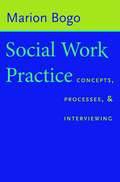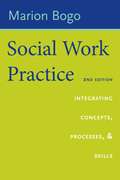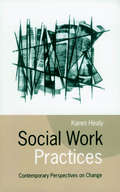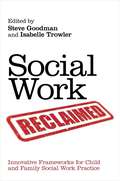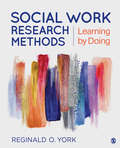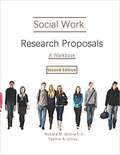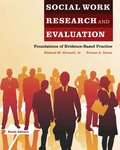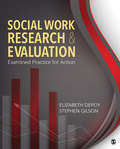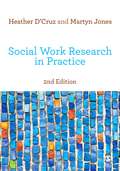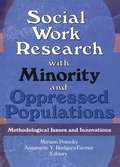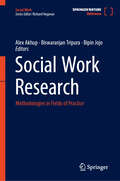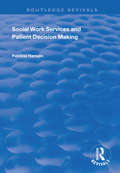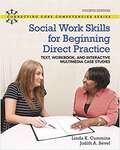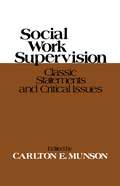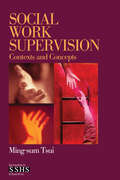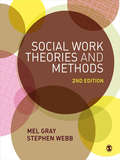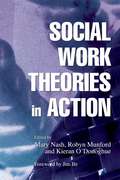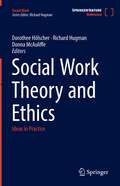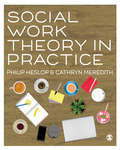- Table View
- List View
Social Work Practice: Concepts, Processes, and Interviewing (Heritage)
by Marion BogoSocial Work Practice synthesizes the latest theories and research findings in social work and related fields and demonstrates how this information is used in working with clients. Because the interview is the medium in which much of social work practice takes place, learning the processes and skills to conduct a productive interview is a critical part of social work education.
Social Work Practice: Integrating Concepts, Processes, and Skills
by Marion BogoSince its publication more than ten years ago, Social Work Practice has been widely used as a succinct and focused book to prepare human service providers in the key components underpinning direct practice. This second edition builds on the first edition’s success at synthesizing the latest theories and practice models; helping and change processes; empirical findings; and practice skills, and demonstrates how these interlinked dimensions contribute to the EPAS 2015-endorsed model of holistic competence.The second edition of Social Work Practice is updated with new empirical findings and foundational information, while also supplementing the text with the concepts and competencies in EPAS 2015. With an overall theme of holistic competence, it incorporates the significant role of cognitive and affective processes in social workers’ professional practice and discusses ways of developing and maintaining a reflective practice. With useful material on interpersonal communication, cross-cultural practice, and the use of technology in one guide, Marion Bogo lays a general foundation for social work practice and professional development.
Social Work Practices: Contemporary Perspectives on Change
by Dr Karen Healy`Karen Healy has written a very interesting and worthwhile book that explores the relevance and significance of postmodern theory to social work. It provides a well-argued account of recent developments in social work theory... However, it is not simply an account of theory, as considerable effort goes into making links between the theory and its implications for practice. ...[I]t offers a sound foundation for exploring issues of theory and practice. A major strength of the book is that it shows that some of the significant flaws in earlier attempts to develop critical approaches to practice should not lead us to assume that radical approaches are necessarily oppressive in themselves, or doomed to failure... It should serve its purpose well in prompting educators, policy-makers and practitioners to begin to take on board the critique of dominant approaches to social work theory and to help us guard against the dangers of dogmatism and orthodoxy' - European Journal of Social Work `Karen Healy profoundly challenges, in the context of the postmodernity of late capitalism, many of the assumptions upon which the critical tradition in social work has been founded. This is a book which interrogates not only the emancipatory metanarratives of left perspectives from her position within the left, but also questions many of the received ideas about her professional power and identity, and about the kinds of social work practices necessary in order to continue to pursue welfare as an emancipatory project under transformed ideological and material circumstances. This is a most significant contribution to the debates which confront social work, worldwide, at the present time' - Peter Leonard, McGill University, Canada How should social workers be responding to the crises which beset the welfare states of the 21st century? Could postmodern theory provide some of the answers? This original and stimulating book provides a critical review of contemporary social work theory and considers its relevance for professional practice. Karen Healy outlines critical theoretical perspectives - including feminist, Marxist and radical social work - and indicates their implications for social work practice. She explains contemporary debates on post-structuralism and postmodernism and shows how their application to everyday social work practice would point to a new pragmatism focused on local, contextual and incremental proposals for change. By referring to actual examples, she invites the reader to consider the potential for relevant and diverse forms of social work practice informed by postmodern theory. This accessible and engaging book makes an important contribution to contemporary debates on social work theory and practice. It will be important reading for students and academics in social work and social policy.
Social Work Reclaimed
by Edited by Steve Goodman Isabelle TrowlerReclaiming Social Work (RSW) is a radical new system for delivering child and family social work in the UK. The system was first piloted in the London Borough of Hackney and the model has gained national recognition. At the heart of this innovative system is the endeavour to keep children together with their families. This book sets out what the Reclaiming Social Work model is, how it was implemented, and how it works. It explains the RSW system of social work 'units' made up of clinicians and therapists and headed by a consultant social worker, and demonstrates how it has worked in practice. The evidence base and theories underlying the model are also explained. Several chapters are written by consultant social workers with extensive experience of working within RSW, which outline the methodological approaches used. This book on a pioneering new social work model will be of great interest to social work managers, policymakers and academics.
Social Work Research Methods: Learning by Doing
by Reginald O. YorkSocial Work Research Methods is a step-by-step journey through the process of conducting research. With over 30 years of teaching experience, author Reginald O. York helps readers discover how research can enable them to better serve clients in the field. Each chapter features a hands-on approach to producing research, with practical chapter exercises that reinforce methods mastery. Using their own data, students engage in realistic research activities and gain an appreciation for science-informed practice as a means of evaluating client outcomes.
Social Work Research Methods: Learning by Doing
by Reginald O. YorkSocial Work Research Methods is a step-by-step journey through the process of conducting research. With over 30 years of teaching experience, author Reginald O. York helps readers discover how research can enable them to better serve clients in the field. Each chapter features a hands-on approach to producing research, with practical chapter exercises that reinforce methods mastery. Using their own data, students engage in realistic research activities and gain an appreciation for science-informed practice as a means of evaluating client outcomes.
Social Work Research Proposals
by Richard Grinnell Yvonne UnrauThis book describes how to do a social work research proposal on a step-by-step basis.
Social Work Research Using Arts-Based Methods (Research in Social Work)
by Ephrat Huss and Eltje BosThis book explores the rationale, methodologies, and results of arts-based approaches in social work research today. It is the first dedicated analysis of its kind, providing practical examples of when to choose arts-based research, how the arts are used by social work researchers and integrated with additional methods, and ways to evaluate its efficacy. The multiple examples of arts-based research in social work in this book reveal how arts methods are inherently connected to the resilience and creativity of research participants, social workers, and social work researchers. With international contributions from experts in their fields, this is a welcome overview of the arts in social work for anyone connected to the field.
Social Work Research and Evaluation (9th Edition)
by Richard M. Grinnell Yvonne A. UnrauOver thirty years of input from instructors and students have gone into this popular research methods text, resulting in a refined ninth edition that is easier to read, understand, and apply than ever before. Using unintimidating language and real-world examples, it introduces students to the key concepts of evidence-based practice that they will use throughout their professional careers. It emphasizes both quantitative and qualitative approaches to research, data collection methods, and data analysis, providing students with the tools they need to become evidence-based practitioners.
Social Work Research and Evaluation: Examined Practice for Action
by Professor Elizabeth G. DePoy Stephen F. GilsonSocial Work Research and Evaluation applies systematically developed research knowledge to social work practice and emphasizes the “doing” of social work as a reciprocal avenue for generating research evidence and social work knowledge. Using the Examined Practice Model, authors Elizabeth G. DePoy and Stephen F. Gilson present research as the identification of a problem and then proceed to evaluate the efficacy of social work practice in its resolution. Diverse theories, actions, and sets of evidence from a range of professional and disciplinary perspectives are included to underscore the importance of integrating evaluation and practice in research.
Social Work Research and Evaluation: Examined Practice for Action
by Professor Elizabeth G. DePoy Stephen French GilsonSocial Work Research and Evaluation applies systematically developed research knowledge to social work practice and emphasizes the “doing” of social work as a reciprocal avenue for generating research evidence and social work knowledge. Using the Examined Practice Model, authors Elizabeth G. DePoy and Stephen F. Gilson present research as the identification of a problem and then proceed to evaluate the efficacy of social work practice in its resolution. Diverse theories, actions, and sets of evidence from a range of professional and disciplinary perspectives are included to underscore the importance of integrating evaluation and practice in research.
Social Work Research in Practice: Ethical and Political Contexts
by Heather D'Cruz Martyn JonesThis new edition of Social Work Research in Practice: Ethical and Political Contexts explores the intrinsic connection between knowledge, research and practice in social work. The authors argue that through a better appreciation of research, the highest standards of social work can be achieved. The second edition investigates contemporary approaches which impact on the discourses of social work research, including: - Evidence-based practice - User-led research - Anti-oppressive practice - Practice-based research Each chapter has been fully updated with a rich range of case examples and references. Further reading is also included, so that readers can expand their knowledge. This book is a valuable resource for both undergraduate and postgraduate students, as well as practitioners working in the field of social work. Heather D'Cruz works as a Consultant: Research and Professional Education. Martyn Jones is Associate Dean at RMIT University.
Social Work Research with Minority and Oppressed Populations: Methodological Issues and Innovations
by Miriam Potocky Antoinette Y Rodgers FarmerLearn the latest and most effective strategies and ideas so you can accurately research oppressed and minority populations!Social Work with Minority and Oppressed Populations: Methodological Issues and Innovations provides social workers, social work researchers, and graduate students with new methodologies for researching topics related to minority and oppressed populations. You will learn how to conduct research with such special populations as ethnic and racial minorities, elders, women, and gay and bisexual men utilizing proven techniques that will yield more precise data and help retain participants in the research program.A must for anyone involved in the field of social work, Social Work with Minority and Oppressed Populations tackles the unique challenges you may face in conducting research with cross-culture populations. This valuble text offers innovative and practical techniques for this type of research, including: methodological issues addressed within the framework of operationalization and conceptualization, measurement, research design, data collection, and data analysis how using the anonymous enrollment technique can be applied to intervention research to engage and retain respondents in case studies how Rasch Analysis, a statistical method, may discern differences in the subjective experiences of members of different racial groups specific examples of how constituent involvement in research projects enhances access to respondents and increases the validity of data why social work practitioners as well as social work researchers must evaluate their knowledge, attitudes, and skills when dealing with cross-cultural populations Discussions on ethical and political issues This compilation of research on methodological issues not only introduces you to new techniques for working with oppressed or minority populations, but also creates new questions and areas of study, such as how to develop culture-specific instruments that better measure depression and its expression among African-American and white populations. Social Work with Minority and Oppressed Populations will provide you with the correct methods and strategies to research cross-culture populations and enable you to address specific problems that different ethnic groups and minorities face.
Social Work Research: Methodologies in Fields of Practice (Social Work)
by Bipin Jojo Biswaranjan Tripura Alex AkhupThis book, sourced from the experience of the social work researchers, educators and practitioners, offers, for the first time from the Indian context, a reflexively situated and insightful pathways to social work research and theorising practice that underlines the importance of 'methodologies in fields of practice'– epistemologies, locationalities and positionalities embedded at varied sites of practices. This understanding is built on the observation that research capturing specific &‘Fields of subjectivities&’ (rural tribal communities, women, children and youth, and persons with disabilities) located in the Indian contexts responds to social issues in complex and diverse situations - a relational ontology. It underscores the scope and new possibilities of research in the Social Work discipline, and its function in contextualizing &‘fields of practice&’. The strength of the book lies in capturing and visibilizing these varied sites of practices through &‘research-practice continuum&’ approach while demonstrating the primacy of &‘methodologies of practice&’ in building a social work knowledge i.e. democratic, emancipatory and locally empowering. Accordingly, the book suggests that strengthening of social work research and theorising practice would entail recognition of 'methodologies in fields of practice' in the context. In doing so, the book underlines the need to take a decolonial approach and intends to strengthen practice-based knowledge for an immediate reference point for social work scholars, researchers, educators, practitioners, administrators and policymakers.
Social Work Science
by Ian ShawWhat is the role of science in social work? Ian Shaw considers social work inventions, evidence-based practice, the history of scientific claims in social work practice, technology, and social work research methodology to demonstrate the significant role that scientific language and practice play in the complex world of social work.By treating science as a social action marked by the interplay of choice, activity, and constraints, Shaw links scientific and social work knowledge through the core themes of the nature of evidence, critical learning and understanding, justice, and the skilled evaluation of the subject. He shows specifically how to connect science, research, and the practical and speaks to the novel topics this integration introduces into the discipline, including experience, expertise, faith, tacit knowledge, judgment, interests, scientific controversies, and understanding.
Social Work Services and Patient Decision Making (Routledge Revivals)
by Patricia HansenFirst published in 1998, this timely study of an American acute care hospital examines decision making by patients and their families along with a cost analysis of social work services. The first part focuses on the patient’s experience of acute hospital care and the second part examines the factors which influence the use of social work resources in providing services to acute hospital patients. Patients were asked about the treatment and discharge decisions made, the agreements that occurred and the problems they experienced while they were in the hospital and after discharge. Surprisingly, the patients reported little difficulty with the decision making environment although it was evident that many experienced a high level of difficulty once discharged. The second part focuses on the utilization of social work resources for these patients. The study uses an activity based framework to examine the cost drivers for social work intervention. It is the first example of the application of ideas from activity based costing to analysis of social work services in hospital settings. Patricia Hansen’s interviews enable us to listen to the voices of those using social work services and the influences on their decision making, presenting a ground-breaking analysis of social work drivers. The findings question what can truly be achieved in such a brief period of time and Hansen presents several sound suggestions to provide comprehensive and effective psychosocial services for patients and families. Her study serves as a gold standard for future social work research on this issue.
Social Work Skills For Beginning Direct Practice: Text, Workbook And Interactive Multimedia Case Studies
by Linda Cummins Judith SevelGuide students through all stages of the helping process and assist them in developing time-tested social work skills. Social Work Skills for Beginning Direct Practice: Text, Workbook and Interactive Multimedia Case Studies, Fourth Edition, provides social work students with the social work practice knowledge and skills required for engaging in a successful helping process with clients. The integrated text, workbook, and interactive multimedia cases allow students to explore how to use social work skills in each stage of the helping process―from engagement and intake through termination. Students learn about attending behaviors, basic interviewing skills such as lead-in responses, paraphrasing, and reflection of feelings, and more advanced skills such as confrontation and summarization. Students then learn how to apply these essential interviewing skills in order to work effectively with diverse client groups. Social work theory, policy, therapeutic approaches, and evaluation techniques are integrated throughout the book to provide the essential elements of direct social work practice. The new edition includes expanded content on cultural competency, cultural awareness, evaluation, and client termination and keeps students up-to-date with the information they need to provide thorough, effective, direct social work practice with diverse client groups.
Social Work Skills with Adults
by Andy MantellSocial work practice with adults has been undergoing a major change in recent years. The traditional divisions between health and social services have been gradually eroded, with the shift to the single assessment process and with social workers increasingly finding themselves employed within the health or independent sector. Therefore, knowing the full range of social work skills is vital and central to good practice with adult service users. This new guide will help students to understand these skills and includes chapters on intervention, empowerment and advocacy, skills for collaborative working, self-presentation and much more.
Social Work Supervision
by Carlton E. MunsonClassic textbook to train the next generation of social workers.
Social Work Supervision: Contexts and Concepts (Sage Sourcebooks for the Human Services Series)
by Ming-Sum TsuiA book on social work supervision is desperately needed to bridge the gap between the demands of the field and the absence of literature. Social Work Supervision: Contexts and Concepts aims to provide readers with basic knowledge of theories, research, and practice of supervision. The book addresses the needs of social work supervisors, frontline practitioners, students, and educators and contains a comprehensive literature review of the historical development, theories and models, and empirical research studies of the subject. Equally important, this is a book from practice experience in supervision that enhances the competence of supervisory practice. It will help social workers, supervisors, and administrators to realize and revitalize their "mission" in social work, that is, to benefit clients.
Social Work Theories and Methods: Theories And Methods
by Stephen Webb Mel GrayThe second edition of this celebrated book by two of the world's leading researchers in social work introduces readers to the main theories, theorists and perspectives that contribute to the debate on social work theory and social work methods. It brings together some outstanding international researchers in social work to challenge the reader to critically question how they think about social work. The new edition includes a focus on the psychosocial perspective, with three new chapters on: - Cognitive behavioural approaches - Attachment theory and psychoanalytic social work - Ecological approaches Each chapter allows the reader to relate the theories and methods discussed to their own personal experiences. This reader friendly book includes student questions, glossaries and recommended reading so that students and practitioners can reappraise and expand the knowledge they have learned. This book will be valuable for undergraduate and postgraduate students taking courses in social work theory and research methods, social work interventions and perspectives as well as post qualifying students and researchers in social work.
Social Work Theories in Action
by Mary Nash Marie Connolly Kieran O'Donoghue Robyn Munford Kieran O ''DonoghueThis wide-ranging collection of essays offers valuable insights into the cultural issues involved in the practical application of social work theories. Leading contributors explore the challenges faced by indigenous populations and ethnic minority groups, examining how they can gain control over their position as minority populations, and offering valuable guidance on cross-cultural work. The direct implementation of four established theoretical approaches - ecological systems, community development, strengths-based approaches and attachment theories - is shown in a variety of contexts, including mental health care, trauma counselling and child protection. Using community development work in Australia and New Zealand as a case study, the contributors also advocate using these approaches in work with migrants and refugees. Social Work Theories in Action recognizes the importance of drawing on the strengths of families, individuals and communities and offers theoretical perspectives that can be applied in everyday work situations. It is essential reading for social and community workers, mental health professionals and social work students.
Social Work Theory and Ethics: Ideas in Practice (Social Work)
by Richard Hugman Dorothee Hölscher Donna McAuliffeThis reference work addresses the ideas that shape social work. Much of the social work literature addresses questions of theory and ethics separately, so that the body of thought that is represented in social work scholarship and research creates a distinction between them. However, the differences between these categories of thought can be somewhat arbitrary. This volume goes beyond this simple separation of categories. Although it recognises that questions of theory and ethics may be addressed distinctly, the connections between them can be made evident and drawn out by analysing them alongside each other.Social work's use and development of theory can be understood in two complementary ways. First, theory from the social sciences and other disciplines can be applied for social work; second, considered, systematic examinations of practice have enabled theory to be developed out of social work. These different approaches are usually referred to as 'theory for practice' and 'practice theory'. The advancement of social work theory occurs often through the interplay between these two dimensions, through research and scholarship in the field.Similarly, social work ethics draw on principles and concepts that have their roots in philosophical inquiry and also involve applied analysis in the particular issues with which social workers engage and their practices in doing so. In this way social work contributes to wider debates through advancement of its own perspectives and knowledge gained through practice.Social Work Theory and Ethics: Ideas in Practice offers a unique approach by bringing together the complementary dimensions of theory with each other and at the same time with ethical research and scholarship. It presents an analysis of the ideas of social work in a way that enables connections between them to be identified and explored. This reference is essential reading for social work practitioners, researchers, policy-makers, academics and students, as well as an invaluable resource for universities, research institutes, government ministries and departments, major non-governmental organisations, and professional associations of social work.
Social Work Theory and Practice with the Terminally Ill
by Joan K ParrySocial Work Theory and Practice with the Terminally Ill, second edition, takes a compassionate look at ways that social workers can help dying people and their families. The social workers who work most effectively with terminally ill patients and their families are the ones who best understand the multifaceted nature of the dying process and its impact on the the patient, the family, and even on the health care professionals who work with patients at the end of life. Dr. Parry--who specializes in dying and bereavement--offers astute observations on the stages of dealing with the diagnosis of a terminal illness and the impending death that patients and their families confront. This updated second edition provides valuable new information on ways that social workers can help those with AIDS and their families, on traumatic death from any cause, and on the grieving processes of parents.Social Work Theory and Practice with the Terminally Ill, second edition, also includes stimulating discussions on: the interdisciplinary health team the grieving process professional burnout how social workers adapt to working with dying patients euthanasia and physician-assisted dying living wills and patients’rightsIn touching case studies, this volume illustrates the particular needs and concerns of the terminally ill and their families--impending losses, financial worries, job concerns, pain, unfinished business, and spiritual needs--and reviews successful interventions used by social workers to help patients and their families work through the dying process.
Social Work Theory in Practice
by Philip Heslop Cathryn MeredithA step-by-step guide to the underpinning theoretical knowledge in social work helping your students to confidently apply theory in practice. - Exercises will help them get to grips with the essentials and reflect on learning. - Case studies from eight fictional social workers located in a busy local authority office will allow them to explore a range of different practice experience, theoretical perspectives and approaches to understanding situations and identifying possible courses of action. - The authors’ own experiences will show the importance of reflection, supervision and continual learning to help them prepare for the reality of practice.
